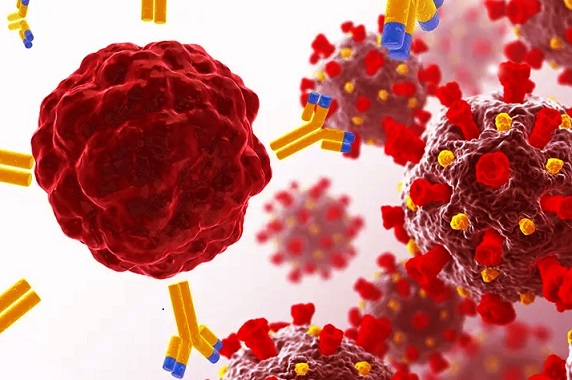Nikhil Prasad Fact checked by:Thailand Medical News Team Jul 06, 2025 7 months, 4 days, 8 hours, 12 minutes ago
Thailand Medical News: COVID-19 and Cancer Share a Sinister Link Through RBM15
Emerging scientific studies are shedding light on a surprising molecular connection between COVID-19 and cancer. At the center of this discovery is a protein called RNA Binding Motif Protein 15 (RBM15), a critical regulator of RNA modifications in human cells. It turns out that SARS-CoV-2 infection significantly disrupts this protein’s normal function, with potentially devastating consequences—not just for viral severity, but also for cancer progression and treatment resistance.
 COVID-19 Triggers RNA Protein That Fuels Cancer Progression
COVID-19 Triggers RNA Protein That Fuels Cancer Progression
This exclusive
Thailand Medical News report is the first to warn that SARS-CoV-2 triggers cancer progression via the RBM15 protein. RBM15 is part of the so-called m⁶A methylation complex, a molecular system that tags specific RNA molecules to control how genes are expressed. In healthy conditions, it plays a key role in cellular development and immune regulation. But when hijacked by a virus like SARS-CoV-2, RBM15 may become a tool for destruction, amplifying both inflammation and oncogenic pathways.
How SARS-CoV-2 Hijacks RBM15
In patients with severe COVID-19, researchers have found that RBM15 is consistently overexpressed. This upregulation appears to drive abnormal RNA methylation patterns—chemical modifications to RNA that can drastically alter how immune and inflammatory genes behave. The result? A deadly storm of cellular dysfunctions, including:
-Excessive immune cell death (particularly lymphocytes)
-Heightened inflammatory responses
-Uncontrolled activation of genes linked to cell death and cytokine storms
These changes are not just theoretical. In laboratory experiments, scientists were able to reverse many of these harmful effects simply by reducing RBM15 levels in infected cells. The findings suggest that RBM15 doesn’t just respond to the virus; it actively shapes the course of the disease.
RBM15’s Role in Cancer Development and Spread
While RBM15's involvement in COVID-19 is alarming, its role in cancer is even more established—and potentially more dangerous when combined with viral triggers. In numerous studies across different cancer types—such as colorectal, pancreatic, lung, and breast cancers—RBM15 has been shown to:
-Promote tumor cell proliferation and migration
-Enable drug resistance, especially to chemotherapy and targeted therapies
-Facilitate epithelial–mesenchymal transition (EMT), a process linked to metastasis
-Support immune evasion by reshaping the tumor microenvironment
In essence, RBM15 acts like a master switch, activating or silencing genes that help cancer cells survive, spread, and resist treatment.
COVID-19 May Accelerate Cancer Through RBM15
The fact that RBM15 i
s involved in both severe COVID-19 and various cancers is more than coincidental. Scientists are beginning to suspect that SARS-CoV-2 may inadvertently activate pro-cancer pathways in some patients by driving RBM15 activity. This could partially explain why some post-COVID patients report aggressive cancer recurrence or resistance to therapies that had previously worked.
Some of the most concerning findings include:
-In lung cancer, RBM15 helps tumor cells resist EGFR inhibitors by methylating and stabilizing oncogenic mRNAs
-In colorectal cancer, RBM15 suppresses immune cell infiltration and alters cellular metabolism, making tumors more aggressive and immune-resistant
In pancreatic and ovarian cancers, high RBM15 levels correlate with shorter patient survival and more invasive disease
When layered over the inflammatory chaos triggered by COVID-19, these cancer-driving mechanisms may be supercharged, leading to faster progression and poorer outcomes.
A Target for Dual Disease Intervention
Given its central role in both COVID-19 and cancer, RBM15 is now being eyed as a potential therapeutic target. In the context of COVID-19, suppressing RBM15 may help:
-Protect lymphocytes from virus-induced apoptosis
-Tame the hyperinflammatory response in critical patients
- survival in severe cases
In cancer, blocking RBM15 function could:
-Restore sensitivity to targeted therapies like EGFR inhibitors
-Slow tumor growth and metastasis
-Boost immune cell infiltration, making immunotherapy more effective
Researchers are already exploring ways to inhibit RBM15, either directly or by interfering with the broader m⁶A methylation machinery. While no drugs targeting RBM15 have reached clinical trials yet, the groundwork has been laid for novel treatments that could tackle both viral inflammation and cancer at the molecular level.
The Road Ahead
As researchers continue to uncover the hidden interplay between viral infections and cancer, RBM15 stands out as a powerful molecular link. Its dual role in COVID-19 severity and tumor biology underscores how a single protein can tip the balance between health and disease in profoundly different ways.
With COVID-19 likely to remain endemic and cancer rates rising globally, understanding and targeting epitranscriptomic factors like RBM15 could open new avenues for integrated treatment strategies. It’s a reminder that the molecular aftermath of viral infections can extend far beyond the initial illness—and that vigilance, both in research and clinical practice, is essential.
References and Scientific Studies:
https://www.nature.com/articles/s41419-021-04012-z
https://www.nature.com/articles/s41419-021-04012-z
https://www.frontiersin.org/journals/oncology/articles/10.3389/fonc.2024.1375942/full
https://www.nature.com/articles/s41388-024-03220-z
https://www.mdpi.com/2072-6694/15/4/1084
https://www.frontiersin.org/journals/immunology/articles/10.3389/fimmu.2025.1515568/full
https://www.dovepress.com/rna-binding-motif-protein-15-rbm15-structure-function-and-its-research-peer-reviewed-fulltext-article-IJGM
https://www.mdpi.com/2075-4655/6/3/16
https://www.mdpi.com/1422-0067/21/10/3409
https://www.sciencedirect.com/science/article/pii/S0753332224001124
For the latest on COVID-19, keep on logging to
Thailand Medical News.
Read Also:
https://www.thailandmedical.news/news/breaking-covid-19-infection-triggers-genetic-change-in-thyroid-tissues-that-accelerates-thyroid-cancer-progression
https://www.thailandmedical.news/news/covid-19-spike-protein-triggers-dangerous-arginine-imbalance-in-blood-vessels
https://www.thailandmedical.news/news/sars-cov-2-triggers-methylation-shifts-in-long-non-coding-rna-to-suppress-immunity-and-promote-viral-persistence
https://www.thailandmedical.news/articles/coronavirus
